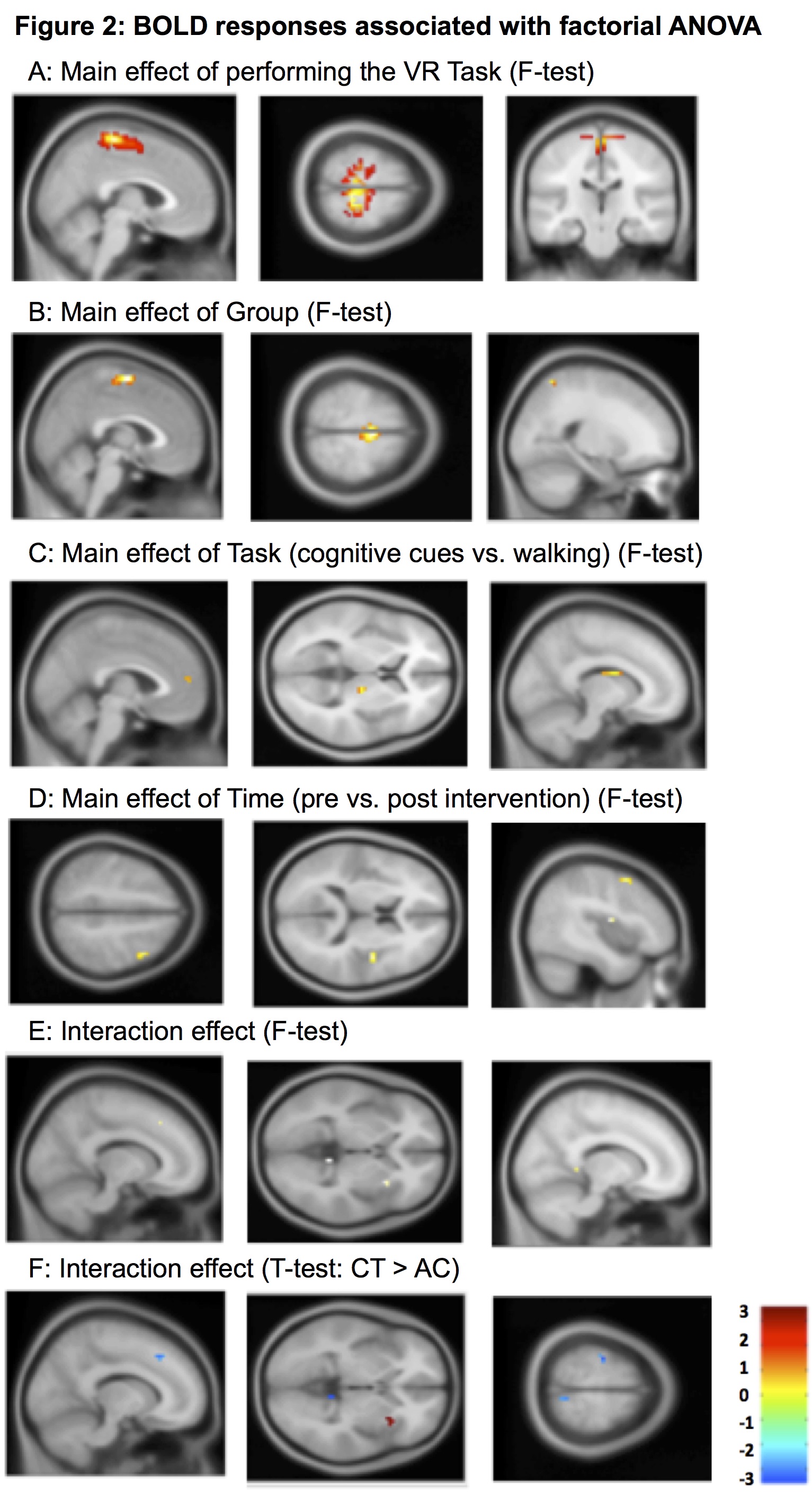Session Information
Date: Monday, October 8, 2018
Session Title: Parkinson's Disease: Neuroimaging And Neurophysiology
Session Time: 1:15pm-2:45pm
Location: Hall 3FG
Objective: This study set out to investigate whether a targeted cognitive training program (CT) induced neural plasticity processes associated with reduced propensity for freezing of gait (FOG) in Parkinson’s disease (PD).
Background: FOG is a highly debilitating feature of PD that causes regular falls. Although the pathophysiology underlying FOG remains poorly understood, there is converging evidence to suggest that deficits in executive functioning contribute to FOG. Our group therefore tested the effect of a CT program targeting executive functioning on FOG severity (under review). Here we present the secondary neuroimaging outcomes of that study.
Methods: Twenty-four patients with PD and FOG performed a virtual reality gait paradigm (VR) during functional magnetic resonance imaging (fMRI) in their “OFF state”, before and after completing either a 7-week CT program (n=13) or an active control (AC) condition (n=11) (Figure 1A). During the VR, patients alternately depressed foot-pedals while processing cognitively demanding cues in a pseudo-random fashion. Dual task cost was calculated as the difference in coefficient of variation (CV) in footstep latencies during periods of high cognitive load compared to periods without cognitive cues (i.e. ‘simple walking’). Blood oxygen level dependent (BOLD) responses were entered in a Group x Task x Time factorial ANOVA using SPM12. [figure 1]
Results: As expected, CV was higher during high cognitive load compared to simple walking (t=6.35, p<0.01) and a reduction in dual task cost was found following CT (ΔCV=-1.16) compared to AC (ΔCV=+0.54), although the interaction was non-significant (p>0.1) (Figure 1B). Figure 2 shows the BOLD changes associated with the factorial ANOVA on VR performance. The interaction effect of interest revealed that CT increased BOLD in the right putamen, whereas BOLD in the left superior frontal cortex and right lingual gyrus decreased compared to the AC condition (Figure 2F).
Conclusions: Taken together, these results indicate that CT allowed patients to perform stepping in the VR in a more automatic manner[1], thereby aiding in reducing their reliance on cognitive control to operate steps and lowering the risk for FOG[2].
References: [1] Gilat M, Bell PT, et al. (2017) Dopamine depletion impairs gait automaticity by altering cortico-striatal and cerebellar processing in Parkinson’s disease. Neuroimage. 152: p207-220. [2] Vandenbossche J, Deroost N, et al. (2012) Freezing of gait in Parkinson’s disease: disturbances in automaticity and control. Front Hum Neurosci. 6: p.356. [figure2]
To cite this abstract in AMA style:
M. Gilat, C. Walton, L. Mowszowski, J. Shine, J. Hall, M. Georgiades, A. Muller, C. O'Callaghan, K. Ehgoetz Martens, J. Szeto, S. Naismith, S. Lewis. The neural effects of a randomized controlled cognitive training program for treating freezing of gait in Parkinson’s disease [abstract]. Mov Disord. 2018; 33 (suppl 2). https://www.mdsabstracts.org/abstract/the-neural-effects-of-a-randomized-controlled-cognitive-training-program-for-treating-freezing-of-gait-in-parkinsons-disease/. Accessed March 1, 2026.« Back to 2018 International Congress
MDS Abstracts - https://www.mdsabstracts.org/abstract/the-neural-effects-of-a-randomized-controlled-cognitive-training-program-for-treating-freezing-of-gait-in-parkinsons-disease/


